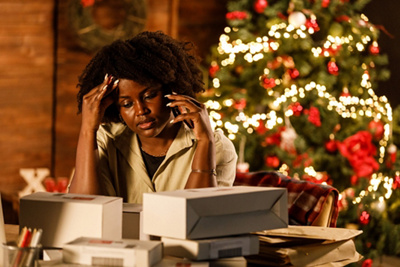Stress, anxiety, and depression are common mental health challenges that peak over the festive season. ER24’s Trauma Support Co-Ordinator explains how to cope.
The festive season is a time to be jolly, goes the traditional narrative – but it isn’t always. “You might have set expectations about how your family will interact with one another during gatherings, how the festive lunch will turn out, what gifts you’ll receive, and what year-end bonus you’ll get,” says Tammy Dicks, Trauma Support Co-Ordinator ER24. “With all these expectations, you might be setting yourself up for disappointment.”
Other people may have different challenges over the season: Stress, anxiety, and depression tend to spike over the holidays if you’re alone, ill, or, for any reason unable to take part in the festivities. It's also common to feel overwhelmed when you’re rushed off your feet with work, household responsibilities, and trying to fit in shopping and social engagements.
Alcohol, drugs and the festive season
Substance use, specifically around the silly season, adds to festive stress. “Many South Africans seem unable to celebrate anything without some alcoholic beverage,” Dicks says. The end-of-year holiday is a time to have fun and relax, but it doesn’t have to mean overindulgence and substance abuse.
“Alcohol triggers some people and lowers their inhibitions. This often leads to saying and doing things they wouldn’t normally say or do if they were sober. It tends to create scenarios such as family arguments, accidents, violence, and reckless spending that can have long-term consequences and cause further stress and anxiety.”
Before you go to a family event, also make a mental note to avoid topics that you know are going to cause conflict.
“Perhaps you’re worried about family members who get out of hand after they've been drinking, or you have worries about overspending. You might feel the burden of having to keep up appearances or the pressure of entertaining family members you’ve not seen for a while. Add the stress of young children demanding attention and the endless cooking, shopping and cleaning, and it’s no wonder you might feel depleted instead of energised.”
3 simple ways to protect against festive stress
Practise self-care
Personal time gets moved to the bottom of the list when you’re overstretched, and you end up neglecting yourself in the process. Set relaxation and exercise time aside every day. Even sitting quietly for a while, taking some deep breaths, and a brisk walk helps. You’ll feel more energised and able to deal with all the added activity and pressures.
Talk about your problems
When you speak about what's going on in your head, it helps to keep things in perspective. Often, a problem can feel bigger than it is if you keep thinking about it. Take a step back and ask yourself: Will it still matter tomorrow, next week, in a year or in five years’ time? This helps you process the problem better. Worrying about something that hasn't happened yet is characteristic of anxiety. Talk about it or write down your concerns. This will help you develop a healthier and more rational perspective on them.
Set boundaries
It’s not unusual to be concerned about how others perceive you, but you may be damaging yourself in the process. You might feel pressure to show how well you’re doing by overextending yourself financially. Or you may be a people pleaser who tries too hard to keep others happy. Instead of putting yourself last, make a point of defining your expectations and explain your limits. Tell friends and family that gifts will be simple and meaningful this year, or that it will be a smaller gathering than usual. Setting boundaries doesn’t mean you’re being selfish – it means you’ll have enough energy in your tank to enjoy the holiday.
Find out more about ER24’s dedicated and professional trauma counselling service here.

